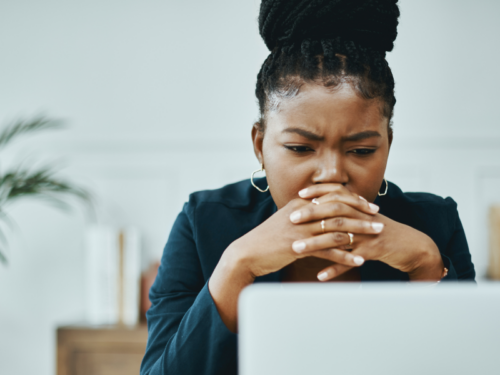
Table of Contents
How to Keep Calm with Panic Disorder

Written By: Alex Bachert, MPH
August 2, 2022
6 min.
If you've experienced more than a few panic attacks, you might have something called panic disorder. We discuss symptoms, causes, and how to cope.
Learn more about our Clinical Review Process
Table of Contents
Let’s talk about panic attacks.
Your heart is pounding, it’s hard to breathe, and you can’t think clearly. You might even feel a bit dizzy or numb. Sure, this only lasts for a few minutes but it can feel like forever.
Panic attacks occur at random and can strike at any time—during class, while on a date, or even when you’re sleeping. Not everyone who has a panic attack will develop panic disorder, but if you’ve had at least two panic attacks and then spend at least one month worrying about another, then you might consider learning more about this mental health condition.
Panic disorder is a type of anxiety disorder that affects just over two percent of adolescents in any given year. Females are more likely than males to develop panic disorder, and symptoms usually begin during adolescence or young adulthood. In fact, roughly half of people will develop the condition before they turn 24.
Whether you’ve only experienced one attack or think you might be suffering from panic disorder, these episodes can be extremely scary—especially when you’re not sure how to cope. Here, we’ll break down the cause of panic attacks and review various treatment options to help you live your life to the fullest.
What causes panic?
Panic is the body’s natural response to dangerous or stressful situations. Let’s say a car cuts the corner too fast and nearly hits you as you’re crossing the street, or you’re staring down at the end-of-year exam that stands between you and summer vacation—it’s completely normal to experience anxiety or stress in these scenarios.
With panic disorder however, a person’s brain will go into “fight-or-flight mode” even when there’s nothing to be concerned about. In this situation, adrenaline will start flowing and your heartbeat and breathing will quicken. Normally, these sensations would help you navigate threatening situations but without the fear of danger they can be overwhelming and scary.
Panic disorder: signs and symptoms
Panic disorder causes a wide range of mental and physical symptoms in teens. Common indicators of panic disorder include:
- Sudden and repeated episodes of panic, fear, and anxiety
- Feeling out of control or impending doom during a panic attack
- Intense worry or preoccupation about when the next panic attack will happen
- Avoiding places where panic attacks have occurred in the past
Join the Charlie Health Library
Get mental health updates, research, insights, and resources directly to your inbox.
You can unsubscribe anytime.
Physical symptoms during a panic attack:
- Racing heart
- Chest or stomach pain
- Sweating
- Chills
- Trembling
- Difficulty breathing
- Weakness or dizziness
- Tingly or numb hands
Panic disorder: causes and risk factors
Experts are still researching the exact cause of panic disorder, but they suspect it relates to a combination of genetic, neurobiological, behavioral, and environmental factors (just like most other anxiety disorders and mental health conditions).
We know that panic disorder often runs in families, but are still unsure why some family members inherit the condition and others don’t. Other recent research points to a genetic component. A 2016 review found that several anxiety disorders, including panic disorder, are all linked to specific genes. And a study from 2020 found that panic disorder was linked to 40 different genes, most of which were related to neurotransmitters, the body’s system of chemical messengers.
Other risk factors for developing panic disorder include a history of substance use or other mental health conditions, specifically major depressive disorder and agoraphobia (a fear of places and situations that might cause panic).

Panic disorder: diagnosis and treatment
If you suspect that you might have panic disorder, it's important to talk with a healthcare professional as soon as possible. Before your visit, it’s helpful to think about how often you experience panic attacks, if the attacks seem to coincide with certain events, and if you have any questions that you want to be answered.
Your doctor will likely complete a physical examination to rule out any physical causes for the symptoms, then review your medical history—including any mental health conditions or anxiety disorders that run in your family.
A panic disorder diagnosis may feel crushing, but it also provides you with support and resources to treat your symptoms. In fact, there are several proven ways to effectively manage the condition.
Do you need more support with
your mental health?
Charlie Health can help.
Therapy for panic disorder
If you decide to explore psychotherapy to treat your panic disorder, your provider will likely suggest a practice called cognitive behavioral therapy, or CBT. CBT raises awareness about negative thinking patterns and can actually teach you how to process and react to the feelings that happen before or during a panic attack. The idea is that by understanding the why and how of your thought cycles, you’ll be better prepared to handle your panic attacks.
Lifestyle changes for panic disorder
In addition to therapy, there are other healthy habits you can practice to reduce your panic-related symptoms and regain your confidence.
- Do your research. The more you know about panic disorder, the better prepared you are to handle any future panic attacks. If you’re looking for a place to start, the Anxiety & Depression Association of America offers a great roundup of webinars, blogs, and ally stories.
- Practice relaxation techniques. You may have noticed that your breathing becomes accelerated when you experience a panic attack. In fact, shortness of breath is one of the most common symptoms. By practicing relaxation and breathwork through practices like yoga, you can learn how to better control your breathing and calm yourself before or during an anxious period.
You can also try something called the 54321 ground method in which you identify 5 things you can see, 4 things you can feel, 3 things you can hear, 2 things you can smell, and 1 thing you can taste. This is just one of many calming techniques that may help during a panic attack.
- Kick unhealthy habits. Smoking, alcohol, caffeine, and diet pills are all said to provoke panic attacks. If you know you’re prone to anxiety, see if avoiding these substances has any effect on your mental well-being.
- Get enough sleep. Adequate sleep is recommended for anyone and everyone, but it's especially important for anyone suffering from stress or anxiety. People with anxiety disorders, like panic disorder, are more likely to have higher sleep reactivity, which means that they’re more likely to suffer from trouble sleeping when stressed.
Medication for panic disorder
Certain prescription medications can be used to temporarily treat the symptoms of panic disorder, but they are most effective when combined with other treatments, like psychotherapy and lifestyle changes. Medications include:
- Selective serotonin reuptake inhibitors (SSRIs)
- Serotonin-norepinephrine reuptake inhibitors (SNRIs)
- Benzodiazepines
As always, it’s best to review your symptoms with a healthcare provider to find the right medication or treatment for your specific condition.
Learn how Charlie Health can help
Panic attacks can be really scary. Whether you've had one or 100, there are ways to cope with these bouts of fear and anxiety so that they don’t interfere with your daily functioning.
Charlie Health is committed to providing teens and adolescents with a proactive approach to mental wellness—all from the comfort of their home. Our intensive outpatient program connects you with other people experiencing panic disorder or other types of mental health issues no matter where you live.
To learn more, read our page about other types of anxiety disorders in teens and young adults here.
References
https://www.nimh.nih.gov/health/publications/panic-disorder-when-fear-overwhelms
https://www.nimh.nih.gov/health/statistics/panic-disorder
https://pubmed.ncbi.nlm.nih.gov/26575296/
https://www.mdpi.com/2073-4425/11/11/1310
https://www.charliehealth.com/post/what-is-major-depressive-disorder-symptoms-causes-and-treatment
https://www.nimh.nih.gov/health/statistics/agoraphobia
https://pubmed.ncbi.nlm.nih.gov/19039448/
https://adaa.org/understanding-anxiety/panic-disorder/resources
https://www.charliehealth.com/post/mental-health-and-wellness-benefits-of-yoga
https://www.charliehealth.com/post/improving-your-mental-health
https://pubmed.ncbi.nlm.nih.gov/29797753/





